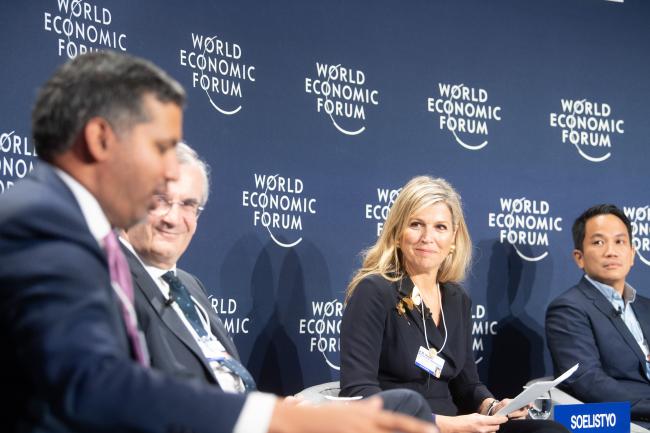
H.M. Queen Máxima of the Netherlands, the United Nations Secretary-General’s Special Advocate for Inclusive Finance for Development (UNSGSA), provided these opening remarks to encourage financial health while promoting financial inclusion at the "Financial Inclusion: Addressing the Largest Gaps" during the World Economic Forum (WEF) Davos Meetings on 24 May 2022.
--
Ladies and Gentlemen,
We have come together at a defining moment. As we emerge from a global pandemic that has kept us apart, we are seeing that it has also spawned an unprecedented number of digital connections.
When COVID-19 hit, governments rushed to provide financial relief to citizens, often through digital channels. At the same time, social distancing forced people to find alternatives to cash and face-to-face shopping.
Mobile money usage skyrocketed. In Latin America alone, 50 million adults began using digital merchant payments.
The latest data will arrive this summer when the new Global Findex is released, but we already know that over 1.2 billion adults have gained access to financial services in the last decade. We can expect that to grow by many millions more.
If we have learned one thing about financial inclusion, it is that better access, new users, and higher transaction numbers is simply not enough.
Over the past year, I have advocated for enhancing the resilience of underserved groups in the face of economic shocks, so they are better able to seize economic opportunities.
MSMEs have been hard-hit by COVID-19, especially informal ones and those owned by women. For these enterprises, going from pen and paper to digital is one of the keys to financial recovery and resilience.
At the G20 Leaders’ Summit in Rome last year, I urged governments to accelerate digital solutions for MSMEs around the world.
Going digital can open new markets and make businesses more efficient. A digital ecosystem can help small businesses better manage their inventory, marketing, payments, credit, and sales.
It can also help MSMEs gain access to financial services — for example, their data footprint can be used by financial institutions to provide financing more quickly and at better rates.
Another very important issue is once a population is financial included, does it lead to better financial lives? Are they financially healthy?
This is a responsibility that concerns us all. Financial health should be a common goal of governments, regulators, the private sector, the financial sector, and NGOs.
For financial services providers in the room: you will likely discover that investing in your customers’ financial health will mean they can pay their loans on time, purchase other products and services, and cost less to serve. There is a strong business case.
Having better information and insights on customers can also help you design products that influence financial behaviors for the better. Savings products that nudge people to achieve their goals are a great example.
As we continue to close the financial inclusion gap, I encourage you to apply a financial health perspective to your efforts. This will enable us to achieve the purpose of financial inclusion and create more resilient economies.
Thank you, and I wish you a fruitful discussion.
